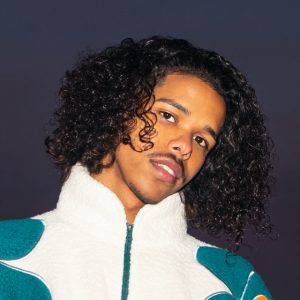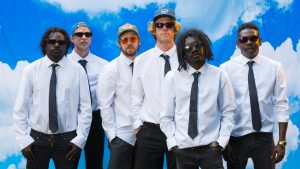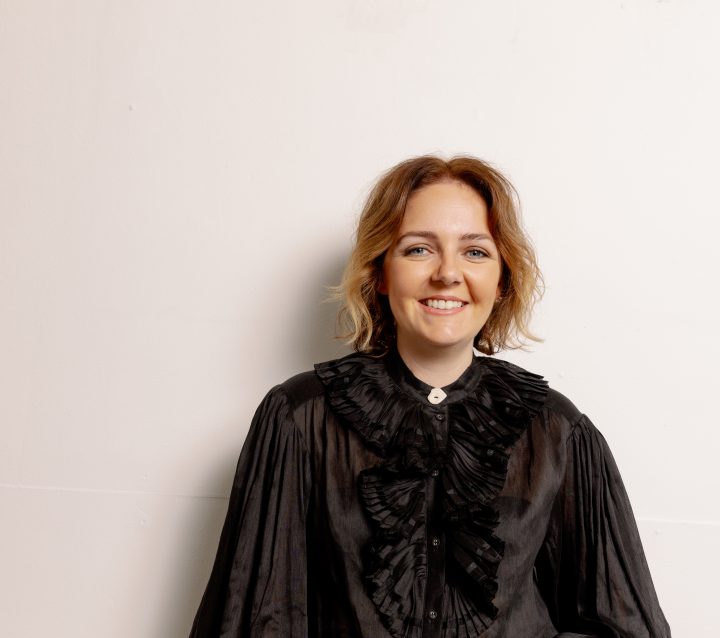Please tell us your story! How did you get to where you are today?
How I got to where I am today is through passion (clichéd, right?), persistence, perseverance, entrepreneurial spirit, a constant curiosity for how things could be better and a solutions mindset.
My story is still unfolding. It’s potentially in the greatest chapter of all right now…
“Music is so much more than learning the basics and that’s what we need more school leaders to understand. The world is a better place when there is more music.”
Why did you want to get into the music industry?
I always loved music. And whilst I played music myself, I loved listening to music and being a fan of it more. From eight years old, I would wake up early every Saturday morning and watch Rage, religiously. The whole Top 50, every week, start to finish. I loved collecting CDs, vinyl, music magazines, music DVDs, merch and ticket stubs (and still do!).
When I was in Year 11, I had to write a business plan for a Business Studies assignment, and I chose to do it for a fictional record label. It was called Riff Records, and it was an independent imprint of Sony.
The more research I did, the more I learnt about the industry and the more I wanted to be a part of it. I also completed a major assignment for Religious Studies on the Christian Pop Punk movement, so I was clearly looking for any excuse to integrate music into school. Side note: I scored very well in both assignments.
So, between loving music, growing up in the 90s (which was the pinnacle of the commercialisation of recorded music), loving the business side of things and cultural movements, it made sense.
But obviously, I didn’t get there in a linear fashion, because that would be boring. When I finished school, I moved from Newcastle to Sydney and started studying Architecture at university, then I landed a few random jobs, dropped out of uni, found myself working in fashion and beauty PR, and eventually transitioned those skills to the music industry.
What is your role & responsibilities in the music industry?
I am the Co-Founder and CEO of a music EdTech company called Amplify. My responsibility is to run the business in a way that ensures as many primary school children as possible are given the opportunity to learn music in the classroom. Because if children aren’t learning music at school, the music industry will look pretty different in the future. And not in a good way!
What have been your career highlights to date?
Being named in the AFR Faster Starters list was definitely up there. Growth is such a key measure of success in the start-up years, and to come in at 42 and be the only EdTech business in the 100 was pretty great.
Have you had to overcome any challenges or adversity in your career, and if so, how did you approach them?
Yes. Of course. Hasn’t everybody? I welcome challenges. Some might say I throw myself right into them. But it’s the only way that growth and change actually happen. If we stay in our comfort zone, nothing meaningful will happen. I approach everything with a healthy balance of logic and gut instinct.
“Music education is a part of the music industry. If kids don’t learn music at school, the industry will not thrive. It is not a coincidence that live music attendance dropped approximately 10 years after music education began to deteriorate in primary schools.”
Who has been your biggest champion in your career?
I have a lot of people in my world who are so supportive of my ambition and they show it in their unique ways. My parents and my in-laws are amazingly supportive, helping with my kids and facilitating our crazy schedule. My kids are resilient and more understanding than you’d expect a 6 and 8-year-old to be, and I have a close circle of friends that I can turn to for almost anything. But on a deeper level, my husband and my dad show support in unique ways, above and beyond.
What is the best piece of life advice you’ve ever received?
This was second-hand advice, but I rate it – “Never be boring.”
Who are your top 3 artists to watch?
Once upon a time, I would have relished in a question like this as a way to demonstrate how ahead of the game I was with new music. These days, I fear this question slightly…
I’ve really enjoyed the rise of R&B again and I’m a big fan of Dean Brady.

I’m still a sucker for an Indie band and enjoy Radio Free Alice.

Jem Cassar-Daly is also excellent. Her lyrics are beyond her years.

Tell us about Amplify Music Education…..
It’s basically my third child (I have two human ones), and I’m so proud of it. It is a software platform that we built to give every teacher in every classroom the capability to teach music.
By equipping every teacher who is already in the classroom, no student will miss out.
The tech-stack is second-to-none. The rich educational content is engaging, and the pedagogy from which it is built pulls from some of the best research in the world. But what makes it even more effective is the way that we have made it contextually and culturally relevant for students. Teachers can teach music in a way that students can relate to and connect with, and this is exceptionally powerful.
We also get to showcase some of the best artists, songwriters and instrumentalists that Australia has to offer. Talk about inspo!
Amplify utilises both worlds of tech innovation and music education. From your unique perspective; What should today’s music industry professionals take note of in the current music education curriculum to implement change for the benefit of future generations?
This isn’t necessarily curriculum-related, but firstly, I would say that children aged 5 – 14 are consuming more music than ever before. This has been accelerated by on-demand access through streaming platforms. When they connect with it, they listen to it over and over and over again. Contrary to (perhaps) popular belief, they don’t listen to & music”, which generally starts to phase out around the age of 4 and 5.
Back in 2022, we released a special lesson for NAIDOC Week that featured King Stingray and their song ‘Milkumana’, and it went off. Kids absolutely loved that song. We still have students asking for that song in lessons now. And all we did was put that song in front of them, and it connected.
Music discovery and real and alive. They do it through TV shows, through their friends and now through Amplify. Kids are now influencing their parents’ musical tastes instead of it being the other way around.

“By equipping every teacher who is already in the classroom, no student will miss out.”
What has been a major concern regarding music within the Australian education system? (eg. accessibility, funding etc)
This is a tricky question because the answer is different depending on where you are in Australia. For any school in a rural or remote area, accessibility is a big factor. But to be honest, this is an area where we saw big growth in Amplify usage pretty quickly. When these schools were presented with a way to teach music, they jumped at the opportunity.
In the city, I would say that the biggest concern is equity. A lot of schools think that they are offering a comprehensive music programme, when in fact it is an extra-curricular band, paid for by the parents. So the barrier to entry is money. This creates an instant inequity, and a programme that doesn’t include every child and doesn’t meet curriculum outcomes in
movement, singing and composition is not comprehensive.
There is a reason music is a compulsory subject in every primary school curriculum in the world. It’s not just about the knowledge and skills attained. It’s about providing a rich education that includes understanding of self, expression, connection, and a sense of belonging. Music is so much more than learning the basics and that’s what we need more school leaders tounderstand. The world is a better place when there is more music.
Where is Australia ranked in music education?
We’re definitely in the bottom half. But right by our side are the UK, USA and Canada.
Countries that are doing it well are Finland, Singapore and Japan.
What are some ways that those within the music community can advocate on their platforms to draw attention to the importance of music education?
By being a part of our content! But also, if they have kids or nieces and nephews who attend primary school, ask what they are doing to meet curriculum outcomes. With Amplify, there is literally no excuse for a school not to be teaching music to every child. And for those with connections in higher places, make sure it has a place in every conversation about the music industry.
What is your big picture career goal?
I want to make Amplify a global business and reach as many students as possible. When I’ve done that, solve another problem that will continue to change the world. Maybe go into politics at some point. Maybe.
Do you think the Australian Music Industry is where it needs to be in regards to diversity?
I don’t think any industry is where it needs to be in terms of diversity. I think at a minimum, the music industry is aware of what they need to do better, and a lot of wonderful people are holding themselves to account.
I have seen real change in the last few years. I’m hopeful.
What was your part of the industry like when you started, compared to now? What do you hope to see in the future?
My first job in the music industry was as a publicist and radio plugger, and those jobs barely exist these days. I worked in the pre-streaming era and got to see the early transition. I remember going to the launches of Deezer and Pandora and thinking, “this is crazy.” The industry literally couldn’t be any different.
In the future, I hope that people still fall in love with artists. I hope that they seek out the album tracks and the B sides (showing my age), and the connection remains stronger than just one song.
What would you tell your younger self if you could tell them anything?
You don’t need all the answers.
Is there a message you would like to give to others in the industry that don’t work in your line of work? Eg. Bookers, label leaders, producers, artists etc.
Music education is a part of the music industry. If kids don’t learn music at school, the industry will not thrive. It is not a coincidence that live music attendance dropped approximately 10 years after music education began to deteriorate in primary schools.
But together, with innovative approaches and great content, the future of music education is bright.
“In the future, I hope that people still fall in love with artists. I hope that they seek out the album tracks and the B sides (showing my age), and the connection remains stronger than just one song.”
What are your plans for 2025? Anything you can let us in on?
The second half of 2025 is shaping up to be pretty exciting. We will be taking our dance and drama programmes from MVP (minimum viable product) to full product after such great feedback, we are building some new technology that I’m super excited about, and we’ll be putting the pedal down on international expansion. Oh, and we’re also doing a Cap Raise! Just a bit going on…
What is your go-to song for Karaoke?
Can’t Fight the Moonlight by Leanne Rymes or something by Celine or Whitney. It’s ironic considering I’m such a terrible singer that I’m drawn to these powerhouse women and songs. But one of my values is ambition, so I guess that adds up.
